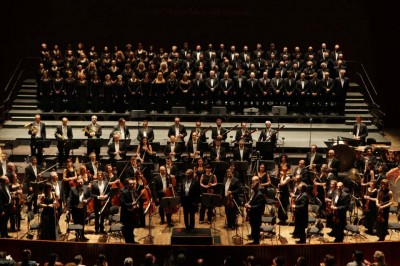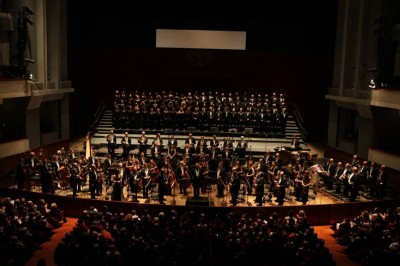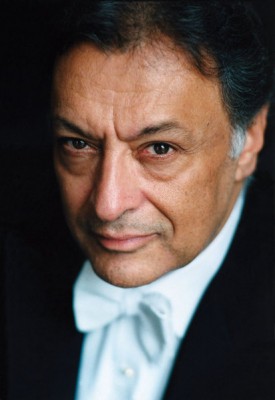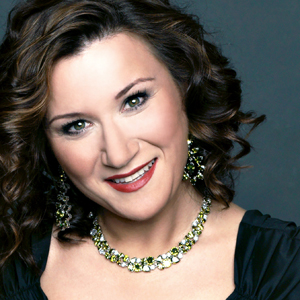DON CARLOS in Firenze.
By Fabio Bardelli on 6/07/13 • Categorized as Opera

Don Carlos by Giuseppe Verdi, concertant in Firenze, conducted by Zubin Mehta, (center). Foto: NEW PRESS FOTO, FIRENZE
DON CARLO by Giuseppe Verdi, in Firenze, Italy
Teatro Comunale, 2013 may 8th- Concert version
.
Conducted by Zubin Mehta
Orchestra e Coro del Maggio Musicale Fiorentino
Maestro del Coro, Lorenzo Fratini
Review by Fabio Bardelli, Foto:
FIRENZE: The opening of 80° Season of Maggio Musicale Fiorentino, last May 2nd (we review the performance of May 8th), was sort of muted down, considering that the opera chosen for the event, Verdi’s Don Carlo, was performed in concert.
This is not very common in Italy (on the contrary it is more common in other countries), and it’s always seen as a sort of second choice, lacking the visual part of the performance, considering that opera is not made just by music and libretto, but must also have its scenic counterpart.
Actually, in Florence a staging was planned created by famous Italian director Luca Ronconi, well known for his play stagings but also for opera, who has always been famous for his magnificence and expensive stagings. But the economic situation of the theatre is so dramatic that it was evident that they could not allow themselves such a financial effort.
Conductor Zubin Mehta has chosen the five Acts version sung in Italian. It’s one of the many possible versions of this masterwork, whose score has been changed and reconsidered many times by Verdi himself.

Don Carlos by Giuseppe Verdi, concertant in Firenze, conducted by Zubin Mehta, (center). Foto: NEW PRESS FOTO, FIRENZE
The opera in Florence has been performed with only one intermission, in two enormous blocks of music: the first (comprending first three acts) lasted more then two hours, and the second (with last two acts) which lasted more than one hour and a half. This put on the test resistance and attention from both the artists and the audience, which filled but didn’t sold out Teatro Comunale, with too many empty seats.
Zubin Mehta‘s very interesting concept of Don Carlo didn’t let us regret the lacking of scenes and costumes. It’s a very theatrical concept, but very carefully reading the many instrumental refinements of the score. It seems that the Indian conductor “feels” very much this opera, not only in the most theatrical and spectacular moments such as the finale Act three, but also in the relationships among the different characters, which has been given out with strong evidence. For sure, it has been a conducting far from the “luxury routine” we were used with Mehta so often.
As we have said, the opera was fully enjoyable also without scenes and costumes even because not only the verses were projected on the top of the curtain as undertitles, but also some stage direction taken from the original libretto, what could make easier for the audience to understand the plot. Of course, maybe someone has asked to himself who could be the Countess of Aremberg, considering that she’s among the characters and Elisabetta sings to her a beutiful aria (“Non pianger, mia compagna”), but was impossible to see among the artists in this performance in Florence because she simply doesn’t sing a single note…
The vocal company (whose singers occasionally went in and out, according if they should have been on scene or not) was placed between orchestra and chorus but it wasn’t homogeneous at all, surely better in male deep voices.
I think that the most interesting singer was very good baritone Gabriele Viviani, (Rodrigo), born in Lucca, who shows a good voice, a very good legato, careful phrasing, with only some little problems in the low notes. He depicts an interesting character (pity for the lack of the dramatic side, because I know Mr
. Viviani is also an excellent actor), a proud and sorrowful Rodrigo, vocally irreproachable and with an exemplary singing line. Probably his voice isn’t so wide, but we must not forget that the singers were behind the orchestra, sometimes kept by Zubin Mehta on a strong volume. The baritone has a very linear and involving way to sing even if he keeps his performance on a discreet, not ostentated level
. He was absolutely exemplary in the Prison Scene, he demonstrates to be a young singer surely to be followed.
Another very interesting young singer is Russian bass Dmitry Beloselskiy who was Filippo II. He shows a solid and bulky voice, even if not of great quality, and apart his vague phrasing and a sort of a generic way in depicting his character, it’s fresh and homogenous. Other faults of his performance were some little uncertainties, anyway he’s is a very promising singer.
Alexander Tsymbalyuk was a very good Monk, a secondary character in this opera because he sings a very short part, but it’s important that this short part is very well sung and well focused in his shifty and enigmatic spirit, in last Act almost a supernatural figure. Mr. Tsymbalyuk has a very interesting and correct voice and uses it very well.
The Grande Inquisitore (Great Inquisitor) was Paata Burchuladze, who after a long and heavy career should understand that it’s time to retire: what’s left of his voice are just unhomogeneous fragments. Actually, also in the past he was never fully convincing, and in the great scene with the other bass, the comparison with Mr. Beloselskiy was pitiless
happy to discuss this further”:implantation of a malleable or inflatable penile sildenafil side effects.
.
Tenor Massimo Giordano as Don Carlo was better focused as a character than as singer, in my opinion he was the weakest point of the cast: a Don Carlo without Don Carlo. His evident problems in the passaggio, his inclination in not to cover enough the sound (a rather annoyng characteristic), his tottering high notes, reached with great effort, all this is only in part compensated by a certain brightness of the voice, that potentially is beautiful in timbre and “important”, but he should refine his tenor more and more for being fully convincing
.
Kristin Lewis (Elisabetta) is a young black American soprano, her Italian pronounciation is quite incomprehensible, but her voice is good. Anyway, she lacks imagination in her phrasing, as well as in passion and credibility to delineate a compelling character like Elisabetta. She is always cold, and doesn’t give emotions, even if she has improved during the performance, and in last act was noteworthy.
Princess Eboli was Ekaterina Gubanova, with her beautiful high mezzo timbre, she holds an exemplary vocal line, not opening too much the low notes as many of her colleagues. She sings always with taste and propriety, and she disengages well in both “Canzone del velo” and “O don fatale”, with personality and expression.
The singers of the secondary parts were acceptable, Orchestra and Chorus really in good shape.
I must really quote the very good first cello of the orchestra, who has a great part in Filippo’s monologue “Ella giammai m’amò” in fourth Act. The success was warm for all the singers, apart some sporadic boo for the tenor.
Cast:
Filippo II, Dmitry Beloselskiy
Don Carlo, Massimo Giordano
Rodrigo, Gabriele Viviani
Il Grande Inquisitore, Paata Burchuladze
Un frate, Alexander Tsymbalyuk
Elisabetta, Kristin Lewis
La Principessa Eboli, Ekaterina Gubanova
Tebaldo, Laura Giordano
Il Conte di Lerma, Saverio Fiore
Un Araldo Reale, Saverio Fiore
Voce dal cielo, Ekaterina Sadovnikova
Deputati fiamminghi, Andrea Vincenzo Bonsignore, Gianluca Margheri, Italo Proferisce, Alessandro Calamai, Davide Ruberti, Marco Bussi
Review by Fabio Bardelli
translation from italian Bruno Tredicine
Please enjoy our review of Don Carlos concertant at Theatre des Champs Elysees 29.4.2013 at: http://www.kulturkompasset.com/2013/04/don-carlos-at-champs-elysees/
Don Carlos in Gothenborg, Sweden at: http://www.kulturkompasset.com/2010/11/don-carlos-i-g%C3%B8teborg/
Don Carlos at Opera Bastille: http://www.kulturkompasset.com/2010/02/don-carlos-at-bastille-paris/
Ekaterina Gubanova:
Please enjoy our review of Hoffmans Tales at: http://www.kulturkompasset.com/2010/05/amusing-and-well-sung-hoffman-at-bastille/
Verdis Requiem: http://www.kulturkompasset.com/2013/05/verdis-requiem-in-florence/



